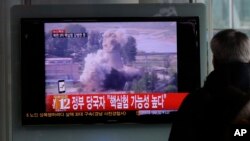A top South Korean diplomat said Seoul is seeking a United Nations resolution that would permit military action against North Korea, following Pyongyang's latest nuclear test.
South Korea's Yonhap news agency quotes the diplomat, who requested anonymity, as saying his country hopes to persuade the U.N. Security Council to adopt a resolution that includes Chapter 7, Article 42 of the U.N. charter.
If a resolution is passed that includes that provision, it could allow military ships anywhere in the world to intercept and board North Korean vessels suspected of carrying weapons or nuclear or missile components prohibited under U.N. sanctions.
The diplomat said, however, he is uncertain if China would endorse a resolution allowing for military action against North Korea.
China, the North's top ally and a veto-wielding member of the U.N. Security Council, has long opposed using Chapter Seven, Article 42 against Pyongyang, although Beijing backed a U.N. resolution after North Korea's long-range rocket launch in December.
That resolution expands asset freezes and travel bans on some North Korean entities.
Resolution Would Send "Strong Signal"
One analyst said a resolution including Chapter 7, Article 42 would send a "strong signal" to North Korea that the world is becoming impatient with the North's nuclear program and "disregard for past resolutions." James Schoff of the Carnegie Endowment for International Peace in Washington also said China would likely be reluctant to support such a measure.
"I think Beijing would see that as very dangerous, would probably provoke North Korea to conducting some further kind of provocation, and they’ve called on all sides to respond calmly," Schoff said.
Schoff also said China would be worried that passing the resolution, not necessarily implementing it, may be enough to "set North Korea off."
China condemned the North's nuclear test on Tuesday and urged Pyongyang to abide by its non-nuclear commitments. Beijing said the issue should be resolved within the long-stalled, six-nation nuclear disarmament talks.
Bruce Klingner, an analyst at the Heritage Foundation in Washington, said China has been "part of the problem, rather than part of the solution," when North Korean sanctions are at issue.
China also has been "obstructionist in the U.N. Security Council, not only being against the Chapter 7 clause but also meaningful resolutions," Klingner said. "For example, last April when the U.S. and South Korea proposed 40 new North Korean entities be added to the sanctions list, China refused all but three. So unfortunately, it's part of the trend by China. We can hope that the new Chinese leadership is more pragmatic in trying to implement more effective and comprehensive sanctions."
An Attack on North Korea
Klingner said some opponents of a resolution including Article 42, Chapter 7, or those unaware of its intent, will see it as the United States seeking justification for attacking North Korea.
"That’s not the case," he said. "The intent is to close a loophole in the U.N. resolutions."
In the past, U.S. Navy ships have only trailed or shadowed North Korean vessels suspected of carrying nuclear missile components or technology.
North Korea's nuclear tests in 2006 and 2009 triggered tough economic and diplomatic sanctions.
The North says it needs nuclear weapons because of what it calls a hostile U.S. policy. It says that promised benefits for ending its nuclear program, such as fuel and economic aid from Western nations, have never materialized. The impoverished country relies heavily on foreign food aid to feed its people.




